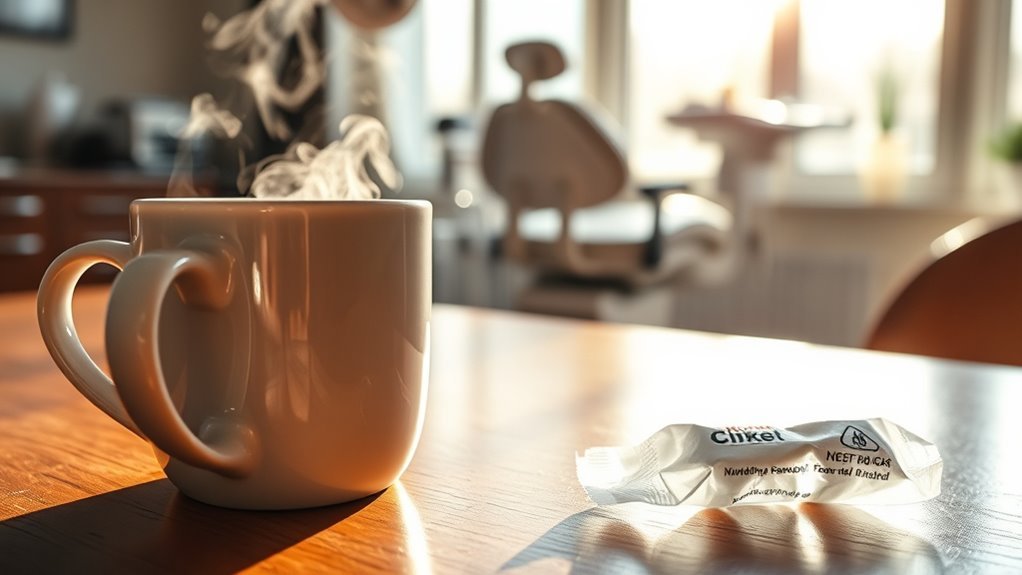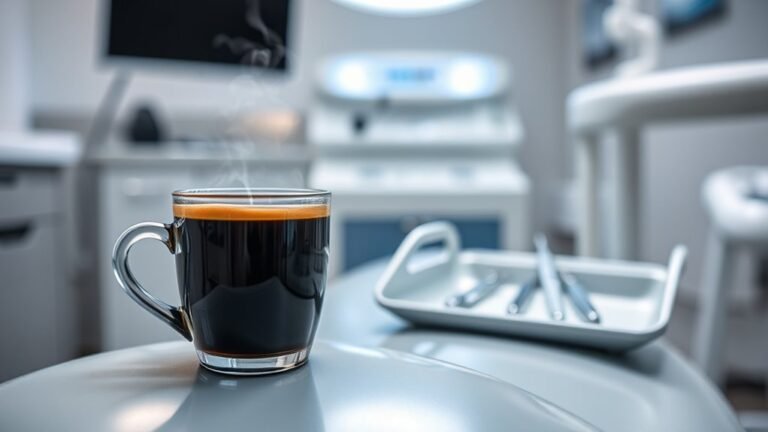Can You Drink Coffee After Wisdom Teeth
You shouldn’t drink coffee right after wisdom teeth removal. Caffeine can hinder your recovery by constricting blood vessels, affecting nutrient delivery, and potentially prolonging discomfort. Plus, it may contribute to dehydration, which can slow healing. It’s best to focus on hydration with water and electrolyte-rich fluids while avoiding caffeine. If you’re curious about how long to wait before enjoying coffee again and other recovery tips, there’s more information available for you.
Understanding the Recovery Process After Wisdom Teeth Removal

After you’ve had your wisdom teeth removed, understanding the recovery process is essential for a smooth healing experience. One of your primary goals should be swelling reduction; applying ice packs intermittently can help manage inflammation effectively. Remember, keeping your head elevated while resting also aids in minimizing swelling. Additionally, infection prevention is vital during this period. Make sure to follow your dentist’s post-operative instructions regarding oral hygiene, including gentle rinsing with salt water as advised. Avoid using straws, as suction can dislodge blood clots and hinder healing. Staying hydrated and maintaining a nutritious diet will support your body’s natural recovery process. By prioritizing these aspects, you’ll set yourself up for a quicker and more comfortable recovery journey.
The Impact of Caffeine on Healing
Caffeine can greatly influence your healing process after wisdom teeth removal. It affects blood flow, which plays an important role in recovery, and may also impact your pain management strategies. Additionally, staying properly hydrated is essential during this time, as caffeine might contribute to dehydration if consumed in excess.
Caffeine and Blood Flow
While many people enjoy a cup of coffee for its stimulating effects, it’s important to contemplate how caffeine can influence blood flow, particularly during the healing process after wisdom teeth removal. Caffeine metabolism can affect blood circulation, potentially leading to complications in recovery. When you consume caffeine, it can constrict blood vessels, which may hinder the delivery of essential nutrients and oxygen to the healing tissues in your mouth. This reduced blood flow could prolong recovery time and increase discomfort. Thus, it’s wise to limit caffeine intake during the initial healing phase to support ideal blood circulation. Keeping your body hydrated and prioritizing nutrient-rich fluids can promote better healing and guarantee a smoother recovery experience.
Pain Management Considerations
Understanding the effects of caffeine on blood flow naturally leads to reflections regarding pain management during recovery from wisdom teeth extraction. While you might be enthusiastic to sip on coffee for comfort, it’s essential to take into account how caffeine can influence your healing process. Caffeine may interfere with certain pain relief strategies, particularly if you’re taking medications like ibuprofen or acetaminophen. It can heighten side effects or create medication interactions that complicate effective pain management. As a result, it’s wise to consult your dentist or oral surgeon about incorporating caffeine into your routine. Ultimately, prioritizing your recovery means being mindful of what you consume, ensuring that your healing remains the focus during this critical time.
Hydration and Recovery Needs
Staying hydrated is essential for recovery after wisdom teeth extraction, and it’s important to take into account how caffeine can affect this process. While you might crave a cup of coffee, it’s vital to take into consideration that caffeine can lead to dehydration, potentially slowing your recovery timeline. To support healing, focus on effective hydration strategies, such as drinking plenty of water and consuming electrolyte-rich fluids. These will help reduce swelling and promote faster recovery. If you do choose to consume caffeine, limit it and balance it with adequate water intake. Ultimately, prioritizing hydration will enhance your overall recovery and help you get back to your daily routine sooner.
Temperature Sensitivity and Oral Surgery
After undergoing oral surgery, such as wisdom teeth extraction, many patients experience heightened temperature sensitivity in their mouths. This sensitivity can lead to increased oral discomfort when consuming hot or cold beverages. The temperature effects on your healing tissues may cause sharp pain or discomfort, making it essential to be cautious about what you consume. During this recovery phase, your mouth is vulnerable, and exposure to extreme temperatures can exacerbate discomfort. As you navigate your post-surgery diet, consider moderating the temperature of your food and drinks to avoid unnecessary pain. Prioritizing comfort during this time will help you heal more effectively, so keep your choices in check and listen to your body’s signals when it comes to temperature variations.
Alternatives to Coffee During Recovery

While coffee may be a beloved morning ritual, it’s important to contemplate alternatives during your recovery from wisdom teeth extraction. Herbal teas, like chamomile or peppermint, can provide soothing warmth without the acidity of coffee. They’re gentle on your healing gums and can help with discomfort.
Additionally, consider smoothie recipes packed with nutrients. Blend soft fruits like bananas or berries with yogurt or almond milk for a delicious, easy-to-consume option. You can even add spinach for an extra health boost. Both herbal teas and smoothies not only satisfy your cravings but also support your recovery by keeping you hydrated and nourished. Embrace these alternatives, and you’ll find enjoyment in your recovery period.
When It’s Safe to Resume Drinking Coffee
Once the initial healing period has passed, you may wonder when it’s safe to resume drinking coffee after your wisdom teeth extraction. Generally, you should wait at least 48 to 72 hours before considering coffee consumption. This timeframe allows your blood clots to stabilize, reducing the risk of complications such as dry socket. By the end of the first week, if you’re feeling comfortable and your recovery timeline is progressing well, you can typically reintroduce coffee into your routine. However, be mindful of how your body responds; if you experience discomfort, it’s best to hold off a bit longer. Always consult your dentist for personalized advice to guarantee a smooth recovery and to enjoy your coffee without worry.
Tips for Enjoying Coffee Post-Recovery

As you reintroduce coffee into your routine, there are a few tips to keep in mind for a pleasant experience post-recovery.
- Start with lukewarm coffee to avoid irritation.
- Consider coffee alternatives like herbal teas or decaf options initially.
- Stay hydrated with recovery beverages, such as coconut water or smoothies, to aid your healing.
- Monitor how your body responds; if discomfort arises, scale back.
These strategies can help you enjoy your coffee while ensuring your mouth stays comfortable. Remember, it’s essential to listen to your body and adjust accordingly. With patience and these tips, you can savor your favorite brew again without compromising your recovery.
Frequently Asked Questions
Can I Drink Iced Coffee After Wisdom Teeth Removal?
After wisdom teeth removal, it’s best to avoid iced coffee for a few days. The cold can be soothing, but the caffeine might exacerbate swelling or discomfort. If you’re worried about caffeine withdrawal, consider iced coffee alternatives like herbal teas or decaffeinated beverages. Staying hydrated with water is essential during recovery, so prioritize that first. Always follow your dentist’s advice for the best healing experience while enjoying your freedom from pain!
How Does Coffee Affect Pain Medication Efficacy?
Did you know that nearly 80% of adults consume caffeine daily? When it comes to pain relief, caffeine can actually enhance the efficacy of certain medications. However, if you’re taking pain medication, it’s essential to be aware of caffeine interaction. While it may boost effectiveness, excessive caffeine can lead to increased side effects, like jitteriness or anxiety. Always consult with your healthcare provider to guarantee you’re balancing pain relief with your caffeine intake effectively.
What if I Can’T Live Without Coffee?
If you can’t live without coffee, it’s important to contemplate the effects of caffeine addiction. Going without your daily cup could lead to withdrawal symptoms like headaches, fatigue, and irritability. However, during recovery, your body needs time to heal, and caffeine might hinder that process. It’s wise to consult with your dentist or healthcare provider to find a balance that supports your recovery while addressing your coffee cravings.
Are There Specific Coffee Types to Avoid?
When considering coffee types, you’ll want to avoid very hot brews, as extreme temperatures can irritate your healing gums. Also, if you’re sensitive to caffeine, it might heighten discomfort or anxiety, making recovery tougher. Opt for cooler, decaf options if you’re craving coffee, as they can provide a satisfying taste without the potential drawbacks. Ultimately, it’s about finding balance while prioritizing your comfort and healing.
Can I Add Milk or Sugar to My Coffee?
As you begin your coffee journey, consider how milk and sugar can transform your cup into a comforting oasis. You can certainly add milk or sugar, but be mindful of your healing process. Opt for milk alternatives like almond or oat milk, and explore sugar substitutes such as stevia or monk fruit for a healthier twist. These additions can enhance your experience while keeping your taste buds dancing and your health in check.






